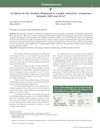TLDR Patients with certain skin diseases are willing to spend significant time on treatment, indicating a high impact on their lives and a need for better treatments.
The study involved 6258 patients with five different skin diseases: Alopecia Areata (AA), Hidradenitis Suppurativa (HS), Atopic Dermatitis (AD), psoriasis, and rosacea. It used a measure called daily Time Trade-Off (dTTO) to assess how much time patients are willing to spend on treatment for freedom from disease. The study found that 33.7% of AA patients and 29.3% of HS patients were willing to spend 2 hours or more per day on treatment, indicating a high disease burden and unmet treatment needs. Disease severity and Dermatology Life Quality Index (DLQI) were significant predictors for dTTO across all diseases. In AA patients, female gender was a strong predictor for a dTTO of more than 30 minutes, possibly due to the impact of hair loss on women's appearance and self-esteem. Socioeconomic status was not a significant predictor, suggesting that income did not majorly impact reported dTTO. The study had limitations including potential selection bias and lack of objective measures of disease severity.
 148 citations
,
March 2022 in “The New England Journal of Medicine”
148 citations
,
March 2022 in “The New England Journal of Medicine” Baricitinib was effective in treating alopecia areata in two major trials.
 46 citations
,
August 2019 in “Journal of the European Academy of Dermatology and Venereology”
46 citations
,
August 2019 in “Journal of the European Academy of Dermatology and Venereology” People with hair loss conditions experience more anxiety, depression, and a lower quality of life than those without these conditions.
 86 citations
,
May 2011 in “Journal of The American Academy of Dermatology”
86 citations
,
May 2011 in “Journal of The American Academy of Dermatology” How bad a woman's hair loss is doesn't always match how it affects her happiness and daily life.
 September 2023 in “Research Square (Research Square)”
September 2023 in “Research Square (Research Square)” TNC+ fibroblasts play a key role in skin inflammation by interacting with T cells.
 15 citations
,
January 2018 in “Acta dermato-venereologica”
15 citations
,
January 2018 in “Acta dermato-venereologica” Skin treatment can lower life quality for patients with skin conditions.
 3 citations
,
December 2022 in “Cells”
3 citations
,
December 2022 in “Cells” Cannabinoids like CBD and THC may help treat non-cancer skin diseases, but more research is needed.
 6 citations
,
March 2020 in “Jornal de Pediatria”
6 citations
,
March 2020 in “Jornal de Pediatria” Inflammatory skin conditions are the most common in Brazilian children, with atopic dermatitis being the top issue.
 11 citations
,
June 2017 in “Anais Brasileiros de Dermatologia”
11 citations
,
June 2017 in “Anais Brasileiros de Dermatologia” More people were diagnosed with certain skin diseases and sexually transmitted diseases in 2014 compared to 2003 in a Brazilian public institution.
 2 citations
,
December 2023 in “JEADV. Journal of the European Academy of Dermatology and Venereology/Journal of the European Academy of Dermatology and Venereology”
2 citations
,
December 2023 in “JEADV. Journal of the European Academy of Dermatology and Venereology/Journal of the European Academy of Dermatology and Venereology” The document suggests a new way to categorize skin and mind disorders into two main groups to reduce confusion.









